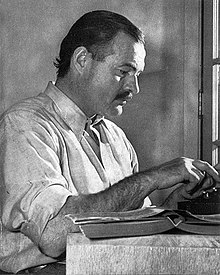Ernest Miller Hemingway
Ernest Miller Hemingway
Ernest Miller Hemigway (July 21, 1899 – July 2, 1961) was an American journalist, novelist, short-story writer, and noted sportsman. His economical and understated style—which he termed the iceberg theory—had a strong influence on 20-th century fiction, while his adventurous lifestyle and his public image brought him admiration from later generations. Hemingway produced most of his work between the mid-1920s and the mid-1950s, and he won the Nobel Prize inLiterature in 1954. He published seven novels, six short-story collections, and two non-fiction works. Three of his novels, four short-story collections, and three non-fiction works were published posthumously. Many of his works are considered classics of American literature.
Ernest Miller Hemingway was born on July 21, 1899, in Oak Par, lllinois, a suburb of Chicago.His father, Clarence Edmonds Hemingway, was a physician, and his mother, Grace Hall Hemingway, was a musician. Both were well-educated and well-respected in Oak Park,a conservative community about which resident Frank Lloyd Wright said, "So many churches for so many good people to go to."For a short period after their marriage, Clarence and Grace Hemingway lived with Grace's father, Ernest Hall, their first son's namesake. Later, Ernest Hemingway would say that he disliked his name, which he "associated with the naive, even foolish hero of Oscar play The Importance of Being Earnest". The family eventually moved into a seven-bedroom home in a respectable neighborhood with a music studio for Grace and a medical office for Clarence.

Comments
Post a Comment